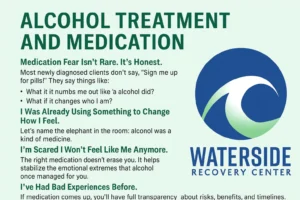You’re here because something cracked open. Maybe it was a conversation, a moment of clarity, or a rock-bottom you didn’t see coming. You’ve taken the first brave step toward getting help for your drinking.
And then a new wave of fear hit:
They want to put me on medication.
It’s okay to be scared. It’s okay to pause.
This isn’t a conversation about weakness. It’s a conversation about trust—especially the kind you’re still rebuilding with yourself.
At Waterside Recovery in Plymouth County, we talk people through this every day. Hesitation about medication is not resistance—it’s a sign you care about your identity, your autonomy, your future.
Let’s explore that fear, without shame.
Medication Fear Isn’t Rare. It’s Honest.
Most newly diagnosed clients don’t say, “Sign me up for pills!” They say things like:
- “What if it numbs me out like alcohol did?”
- “What if I lose my personality?”
- “What if it changes who I am?”
These aren’t superficial fears. They come from real lived experiences—past trauma, side effects, family baggage, or even bad interactions with the healthcare system.
And if your relationship with alcohol was tangled up with emotional pain, masking, or survival? Then trusting something outside yourself—even something helpful—can feel impossible.
We get it. You’re not being difficult. You’re being protective. That’s not a flaw—it’s a survival skill.
“I Was Already Using Something to Change How I Feel.”
Let’s name the elephant in the room: alcohol was a kind of medicine.
It dulled the panic. It made the loneliness quieter. It numbed the pain from trauma that no one knew about. For a while, it helped—until it didn’t.
So when someone suggests another substance—even a prescribed one—it can feel like déjà vu. Another crutch. Another thing you’ll eventually regret.
But here’s the difference:
Medication in alcohol addiction treatment is designed to give you more access to yourself—not less.
Where alcohol shut you down, the right medication supports your brain’s natural regulation. It can help with cravings. It can ease anxiety. It can stabilize depression or help you sleep without sedation.
The goal isn’t to escape your feelings. It’s to be able to feel them without falling apart.
“I’m Scared I Won’t Feel Like Me Anymore.”
We hear this constantly—and we honor it.
Many people worry that medication will:
- Flatten their emotions
- Make them foggy or robotic
- Change how they interact with people
- Destroy their creativity or ambition
But here’s what we’ve learned: the right medication doesn’t erase you. It helps stabilize the emotional extremes that alcohol once managed for you.
Clients often say:
“I thought it would take away my edge. But it gave me a foundation.”
It’s not about turning you into a different person. It’s about helping you feel safe enough to be the person you already are—without alcohol in the driver’s seat.

“I’ve Had Bad Experiences Before.”
This is a big one, and it matters.
If you’ve tried medication in the past—maybe for anxiety, depression, or ADHD—and it left you feeling worse, that memory sticks. It can make you mistrust the whole process.
Maybe a doctor rushed you through an intake. Maybe you weren’t told about side effects. Maybe you felt dismissed.
At Waterside Recovery, we do things differently. If we discuss medication, it’s a conversation, not a command. You’ll have:
- Full transparency about risks, benefits, and timelines
- Ongoing monitoring (and fast adjustments if needed)
- A say in every single decision about your care
This isn’t “just try it and see.” This is let’s figure out what works together.
“What If It Helps—and Then I Have to Stay on It Forever?”
Another honest fear: what happens if the medication works?
That can be almost as scary as it not working. Because now you’re thinking:
- “What if I rely on this forever?”
- “What if I can’t afford it long-term?”
- “Does needing medication mean I’m broken?”
Here’s the truth: some people take meds for a season. Others stay on them long-term. Both are valid. Neither defines your worth or your strength.
We plan with you—never for you. And we don’t prescribe and disappear. Our aftercare includes:
- Support for tapering if you want to try life without meds
- Strategies for staying grounded without pharmacological help
- Referrals for primary care or psychiatric continuity if needed
How Medication Fits Into Alcohol Addiction Treatment
We treat medication as a tool, not a cure.
In our alcohol addiction treatment program, medication may be recommended alongside:
- Medical detox to ensure safe withdrawal
- Therapy to process trauma, triggers, identity, and more
- Intensive Outpatient (IOP) support for structured, flexible healing
- Peer and group support to combat isolation
- Relapse prevention and aftercare planning
This integrated approach means you’re never just medicated. You’re supported in every aspect—biological, psychological, emotional, and spiritual.
And if you’re looking for alcohol addiction treatment in Bristol County, MA, we’ll make sure you feel informed, not rushed.
Real Words from Clients Who Were Scared at First
One client told us:
“I thought I’d feel drugged or detached. What I felt was… grounded. Like I could finally breathe.”
Another shared:
“It didn’t change me. It made it possible for me to show up—for therapy, for my partner, for myself.”
We don’t share these quotes to sell you. We share them so you know you’re not alone in this fear—or in your hope.
FAQ: Medication in Alcohol Addiction Treatment
Do I have to take medication to enter the program?
No. Medication is always optional and collaborative. You can receive full support without a prescription.
Which medications are used in alcohol treatment?
We may use naltrexone (to reduce cravings), acamprosate (to support sobriety), SSRIs (for depression), or other meds based on your needs.
Will it make me feel “high” or sedated?
No. These medications are not mood enhancers or narcotics. They support regulation—not intoxication.
What if I want to stop after a while?
You can. We’ll help you taper safely and reassess your needs over time.
Can I still do therapy if I’m not on meds?
Absolutely. Therapy is available to all clients, whether or not they choose medication.
Is this confidential? Will my job or family find out?
All care at Waterside Recovery is confidential under HIPAA. Your privacy is protected.
You’re Not Broken. You’re Brave.
Here’s what we wish more people heard at the start of treatment:
You’re not “crazy” for asking questions. You’re not “difficult” for needing clarity. You’re not “less than” if you take meds—or if you don’t.
You are not your fear.
You are not your past.
And you are absolutely not alone.
Medication might be part of your story—or it might not. Either way, we’re here to help you write the next chapter with intention, care, and dignity.
Call (866) 671-8620 to learn more about our Alcohol Addiction Treatment services in Plymouth County, MA.
Let’s take the next step together. You get to ask every question. You get to move at your pace. You get to feel like you again.


